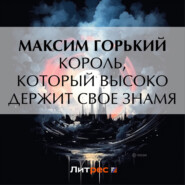По всем вопросам обращайтесь на: info@litportal.ru
(©) 2003-2024.
✖
The Man Who Was Afraid
Настройки чтения
Размер шрифта
Высота строк
Поля
“There is but one man on earth more sinful than was the late Ignat – and that is that cursed heathen, your godfather Yashka,” ejaculated the old man.
“Are you sure of it?” inquired Foma, smiling.
“I? Of course, I am!” said Shchurov, confidently, nodding his head, and his eyes became somewhat darker. “I will also appear before the Lord, and that not sinless. I shall bring with me a heavy burden before His holy countenance. I have been pleasing the devil myself, only I trust to God for His mercy, while Yashka believes in nothing, neither in dreams, nor in the singing of birds. Yashka does not believe in God, this I know! And for his non-belief he will yet receive his punishment on earth.”
“Are you sure of this, too?”
“Yes, I am. And don’t you think I also know that you consider it ludicrous to listen to me. What a sagacious fellow, indeed! But he who has committed many sins is always wise. Sin is a teacher. That’s why Yashka Mayakin is extraordinarily clever.”
Listening to the old man’s hoarse and confident voice, Foma thought:
“He is scenting death, it seems.”
The waiter, a small man, with a face which was pale and characterless, brought in the samovar and quickly hastened out of the room, with short steps. The old man was undoing some bundles on the window-sill and said, without looking at Foma:
“You are bold, and the look of your eyes is dark. Before, there used to be more light-eyed people, because then the souls used to be brighter. Before, everything was simpler – both the people and the sins, and now everything has become complicated. Eh, eh!”
He made tea, seated himself opposite Foma and went on again:
“Your father at your age was a water-pumper and stayed with the fleet near our village. At your age Ignat was as clear to me as glass. At a single glance you could tell what sort of a man he was. While you – here I am looking at you, but cannot see what you are. Who are you? You don’t know it yourself, my lad, and that’s why you’ll suffer. Everybody nowadays must suffer, because they do not know themselves. Life is a mass of wind-fallen trees, and you must know how to find your way through it. Where is it? All are going astray, and the devil is delighted. Are you married?”
“Not yet,” said Foma.
“There again, you are not married, and yet, I’m quite sure, you are not pure any longer. Well, are you working hard in your business?”
“Sometimes. Meanwhile I am with my godfather.”
“What sort of work is it you have nowadays?” said the old man, shaking his head, and his eyes were constantly twinkling, now turning dark, now brightening up again. “You have no labour now! In former years the merchant travelled with horses on business. Even at night, in snowstorms, he used to go! Murderers used to wait for him on the road and kill him. And he died a martyr, washing his sins away with blood. Now they travel by rail; they are sending telegrams, or they’ve even invented something that a man may speak in his office and you can hear him five miles away. There the devil surely has a hand in it! A man sits, without motion, and commits sins merely because he feels lonesome, because he has nothing to do: the machine does all his work. He has no work, and without toil man is ruined! He has provided himself with machines and thinks it is good! While the machine is the devil’s trap for you. He thus catches you in it. While toiling, you find no time for sin, but having a machine – you have freedom. Freedom kills a man, even as the sunbeams kill the worm, the dweller of the depth of earth. Freedom kills man!”
And pronouncing his words distinctly and positively, the old Anany struck the table four times with his finger. His face beamed triumphantly, his chest rose high, and over it the silver hair of his beard shook noiselessly. Dread fell on Foma as he looked at him and listened to his words, for there was a ring of firm faith in them, and it was the power of this faith that confused Foma. He had already forgotten all he knew about the old man, all of which he had but a while ago believed to be true.
“Whoever gives freedom to his body, kills his soul!” said Anany, looking at Foma so strangely as if he saw behind him somebody, who was grieved and frightened by his words; and whose fear and pain delighted him. “All you people of today will perish through freedom. The devil has captured you – he has taken toil away from you, and slipped machines and telegrams into your hands. How freedom eats into the souls of men! Just tell me, why are the children worse than their fathers? Because of their freedom, yes. That’s why they drink and lead depraved lives with women. They have less strength because they have less work, and they have not the spirit of cheerfulness because they have no worries. Cheerfulness comes in time of rest, while nowadays no one is getting tired.”
“Well,” said Foma, softly, “they were leading depraved lives and drinking just as much in former days as now, I suppose.”
“Do you know it? You should keep silence!” cried Anany, flashing his eyes sternly. “In former days man had more strength, and the sins were according to his strength. While you, of today, have less strength, and more sins, and your sins are more disgusting. Then men were like oak-trees. And God’s judgment will also be in accordance with their strength. Their bodies will be weighed, and angels will measure their blood, and the angels of God will see that the weight of the sins does not exceed the weight of the body and the blood. Do you understand? God will not condemn the wolf for devouring a sheep, but if a miserable rat should be guilty of the sheep’s death, God will condemn the rat!”
“How can a man tell how God will judge man?” asked Foma, thoughtfully. “A visible trial is necessary.”
“Why a visible trial?”
“That people might understand.”
“Who, but the Lord, is my judge?”
Foma glanced at the old man and lowering his head, became silent. He again recalled the fugitive convict, who was killed and burnt by Shchurov, and again he believed that it really was so. And the women – his wives and his mistresses – had surely been hastened toward their graves by this old man’s caresses; he had crushed them with his bony chest, drunk the sap of their life with these thick lips of his which were scarlet yet from the clotted blood of the women, who died in the embraces of his long sinewy arms. And now, awaiting death, which was already somewhere beside him, he counts his sins, judges others, and perhaps judges himself, and says:
“Who, but the Lord, is my judge?”
“Is he afraid or not?” Foma asked himself and became pensive, stealthily scrutinising the old man.
“Yes, my lad! Think,” spoke Shchurov, shaking his head, “think, how you are to live. The capital in your heart is small, and your habits are great, see that you are not reduced to bankruptcy before your own self! Ho-ho-ho!”
“How can you tell what and how much I have within my heart?” said Foma, gloomily, offended by his laughter.
“I can see it! I know everything, because I have lived long! Oh-ho-ho! How long I have lived! Trees have grown up and been cut down, and houses built out of them, and even the houses have grown old. While I have seen all this and am still alive, and when, at times, I recall my life, I think, ‘Is it possible that one man could accomplish so much? Is it possible that I have witnessed all this?’” The old man glanced at Foma sternly, shook his head and became silent.
It became quiet. Outside the window something was softly rustling on the roof of the house; the rattle of wheels and the muffled sounds of conversation were heard from below, from the street. The samovar on the table sang a sad tune. Shchurov was fixedly staring into his glass of tea, stroking his beard, and one could hear that something rattled in his breast, as if some burden was turning about in it.
“It’s hard for you to live without your father, isn’t it?” said he.
“I am getting used to it,” replied Foma.
“You are rich, and when Yakov dies, you will be richer still. He’ll leave everything to you.”
“I don’t need it.”
“To whom else should he leave it? He has but one daughter, and you ought to marry that daughter, and that she is your godsister and foster-sister – no matter! That can be arranged – and then you would be married. What good is there in the life you are now leading? I suppose you are forever running about with the girls?”
“No.”
“You don’t say! Eh, eh, eh! the merchant is passing away. A certain forester told me – I don’t know whether he lied or not – that in former days the dogs were wolves, and then degenerated into dogs. It is the same with our calling; we will soon also be dogs. We will take up science, put stylish hats on our heads, we’ll do everything that is necessary in order to lose our features, and there will be nothing by which to distinguish us from other people. It has become a custom to make Gymnasium students of all children. The merchants, the nobles, the commoners – all are adjusted to match the same colour. They dress them in gray and teach them all the same subjects. They grow man even as they grow a tree. Why do they do it? No one knows. Even a log could be told from another by its knot at least, while here they want to plane the people over so that all of them should look alike. The coffin is already waiting for us old people. Ye-es! It may be that about fifty years hence, no one will believe that I lived in this world. I, Anany, the son of Savva, by the surname of Shchurov. So! And that I, Anany, feared no one, save God. And that in my youth I was a peasant, that all the land I possessed then was two desyatins and a quarter; while toward my old age I have hoarded up eleven thousand desyatins, all forests, and perhaps two millions in cash.”
“There, they always speak of money!” said Foma, with dissatisfaction. “What joy does man derive from money?” “Mm,” bellowed Shchurov. “You will make a poor merchant, if you do not understand the power of money.”
“Who does understand it?” asked Foma.
“I!” said Shchurov, with confidence. “And every clever man. Yashka understands it. Money? That is a great deal, my lad! Just spread it out before you and think, ‘What does it contain?’ Then will you know that all this is human strength, human mind. Thousands of people have put their life into your money and thousands more will do it. And you can throw it all into the fire and see how the money is burning, and at that moment you will consider yourself master.”
“But nobody does this.”
“Because fools have no money. Money is invested in business. Business gives bread to the masses. And you are master over all those masses. Wherefore did God create man? That man should pray to Him. He was alone and He felt lonesome, so He began to desire power, and as man was created in the image of the Lord, man also desires power. And what, save money, can give power? That’s the way. Well, and you – have you brought me money?”
“No,” answered Foma. From the words of the old man Foma’s head was heavy and troubled, and he was glad that the conversation had, at last, turned to business matters.
“That isn’t right,” said Shchurov, sternly knitting his brow. “It is overdue – you must pay.
“You’ll get a half of it tomorrow.”
“Why a half? Why not all?”
“We are badly in need of money now.”
“And haven’t you any? But I also need it.”
“Wait a little.”
“Eh, my lad, I will not wait! You are not your father. Youngsters like you, milksops, are an unreliable lot. In a month you may break up the whole business. And I would be the loser for it. You give me all the money tomorrow, or I’ll protest the notes. It wouldn’t take me long to do it!”
“Are you sure of it?” inquired Foma, smiling.
“I? Of course, I am!” said Shchurov, confidently, nodding his head, and his eyes became somewhat darker. “I will also appear before the Lord, and that not sinless. I shall bring with me a heavy burden before His holy countenance. I have been pleasing the devil myself, only I trust to God for His mercy, while Yashka believes in nothing, neither in dreams, nor in the singing of birds. Yashka does not believe in God, this I know! And for his non-belief he will yet receive his punishment on earth.”
“Are you sure of this, too?”
“Yes, I am. And don’t you think I also know that you consider it ludicrous to listen to me. What a sagacious fellow, indeed! But he who has committed many sins is always wise. Sin is a teacher. That’s why Yashka Mayakin is extraordinarily clever.”
Listening to the old man’s hoarse and confident voice, Foma thought:
“He is scenting death, it seems.”
The waiter, a small man, with a face which was pale and characterless, brought in the samovar and quickly hastened out of the room, with short steps. The old man was undoing some bundles on the window-sill and said, without looking at Foma:
“You are bold, and the look of your eyes is dark. Before, there used to be more light-eyed people, because then the souls used to be brighter. Before, everything was simpler – both the people and the sins, and now everything has become complicated. Eh, eh!”
He made tea, seated himself opposite Foma and went on again:
“Your father at your age was a water-pumper and stayed with the fleet near our village. At your age Ignat was as clear to me as glass. At a single glance you could tell what sort of a man he was. While you – here I am looking at you, but cannot see what you are. Who are you? You don’t know it yourself, my lad, and that’s why you’ll suffer. Everybody nowadays must suffer, because they do not know themselves. Life is a mass of wind-fallen trees, and you must know how to find your way through it. Where is it? All are going astray, and the devil is delighted. Are you married?”
“Not yet,” said Foma.
“There again, you are not married, and yet, I’m quite sure, you are not pure any longer. Well, are you working hard in your business?”
“Sometimes. Meanwhile I am with my godfather.”
“What sort of work is it you have nowadays?” said the old man, shaking his head, and his eyes were constantly twinkling, now turning dark, now brightening up again. “You have no labour now! In former years the merchant travelled with horses on business. Even at night, in snowstorms, he used to go! Murderers used to wait for him on the road and kill him. And he died a martyr, washing his sins away with blood. Now they travel by rail; they are sending telegrams, or they’ve even invented something that a man may speak in his office and you can hear him five miles away. There the devil surely has a hand in it! A man sits, without motion, and commits sins merely because he feels lonesome, because he has nothing to do: the machine does all his work. He has no work, and without toil man is ruined! He has provided himself with machines and thinks it is good! While the machine is the devil’s trap for you. He thus catches you in it. While toiling, you find no time for sin, but having a machine – you have freedom. Freedom kills a man, even as the sunbeams kill the worm, the dweller of the depth of earth. Freedom kills man!”
And pronouncing his words distinctly and positively, the old Anany struck the table four times with his finger. His face beamed triumphantly, his chest rose high, and over it the silver hair of his beard shook noiselessly. Dread fell on Foma as he looked at him and listened to his words, for there was a ring of firm faith in them, and it was the power of this faith that confused Foma. He had already forgotten all he knew about the old man, all of which he had but a while ago believed to be true.
“Whoever gives freedom to his body, kills his soul!” said Anany, looking at Foma so strangely as if he saw behind him somebody, who was grieved and frightened by his words; and whose fear and pain delighted him. “All you people of today will perish through freedom. The devil has captured you – he has taken toil away from you, and slipped machines and telegrams into your hands. How freedom eats into the souls of men! Just tell me, why are the children worse than their fathers? Because of their freedom, yes. That’s why they drink and lead depraved lives with women. They have less strength because they have less work, and they have not the spirit of cheerfulness because they have no worries. Cheerfulness comes in time of rest, while nowadays no one is getting tired.”
“Well,” said Foma, softly, “they were leading depraved lives and drinking just as much in former days as now, I suppose.”
“Do you know it? You should keep silence!” cried Anany, flashing his eyes sternly. “In former days man had more strength, and the sins were according to his strength. While you, of today, have less strength, and more sins, and your sins are more disgusting. Then men were like oak-trees. And God’s judgment will also be in accordance with their strength. Their bodies will be weighed, and angels will measure their blood, and the angels of God will see that the weight of the sins does not exceed the weight of the body and the blood. Do you understand? God will not condemn the wolf for devouring a sheep, but if a miserable rat should be guilty of the sheep’s death, God will condemn the rat!”
“How can a man tell how God will judge man?” asked Foma, thoughtfully. “A visible trial is necessary.”
“Why a visible trial?”
“That people might understand.”
“Who, but the Lord, is my judge?”
Foma glanced at the old man and lowering his head, became silent. He again recalled the fugitive convict, who was killed and burnt by Shchurov, and again he believed that it really was so. And the women – his wives and his mistresses – had surely been hastened toward their graves by this old man’s caresses; he had crushed them with his bony chest, drunk the sap of their life with these thick lips of his which were scarlet yet from the clotted blood of the women, who died in the embraces of his long sinewy arms. And now, awaiting death, which was already somewhere beside him, he counts his sins, judges others, and perhaps judges himself, and says:
“Who, but the Lord, is my judge?”
“Is he afraid or not?” Foma asked himself and became pensive, stealthily scrutinising the old man.
“Yes, my lad! Think,” spoke Shchurov, shaking his head, “think, how you are to live. The capital in your heart is small, and your habits are great, see that you are not reduced to bankruptcy before your own self! Ho-ho-ho!”
“How can you tell what and how much I have within my heart?” said Foma, gloomily, offended by his laughter.
“I can see it! I know everything, because I have lived long! Oh-ho-ho! How long I have lived! Trees have grown up and been cut down, and houses built out of them, and even the houses have grown old. While I have seen all this and am still alive, and when, at times, I recall my life, I think, ‘Is it possible that one man could accomplish so much? Is it possible that I have witnessed all this?’” The old man glanced at Foma sternly, shook his head and became silent.
It became quiet. Outside the window something was softly rustling on the roof of the house; the rattle of wheels and the muffled sounds of conversation were heard from below, from the street. The samovar on the table sang a sad tune. Shchurov was fixedly staring into his glass of tea, stroking his beard, and one could hear that something rattled in his breast, as if some burden was turning about in it.
“It’s hard for you to live without your father, isn’t it?” said he.
“I am getting used to it,” replied Foma.
“You are rich, and when Yakov dies, you will be richer still. He’ll leave everything to you.”
“I don’t need it.”
“To whom else should he leave it? He has but one daughter, and you ought to marry that daughter, and that she is your godsister and foster-sister – no matter! That can be arranged – and then you would be married. What good is there in the life you are now leading? I suppose you are forever running about with the girls?”
“No.”
“You don’t say! Eh, eh, eh! the merchant is passing away. A certain forester told me – I don’t know whether he lied or not – that in former days the dogs were wolves, and then degenerated into dogs. It is the same with our calling; we will soon also be dogs. We will take up science, put stylish hats on our heads, we’ll do everything that is necessary in order to lose our features, and there will be nothing by which to distinguish us from other people. It has become a custom to make Gymnasium students of all children. The merchants, the nobles, the commoners – all are adjusted to match the same colour. They dress them in gray and teach them all the same subjects. They grow man even as they grow a tree. Why do they do it? No one knows. Even a log could be told from another by its knot at least, while here they want to plane the people over so that all of them should look alike. The coffin is already waiting for us old people. Ye-es! It may be that about fifty years hence, no one will believe that I lived in this world. I, Anany, the son of Savva, by the surname of Shchurov. So! And that I, Anany, feared no one, save God. And that in my youth I was a peasant, that all the land I possessed then was two desyatins and a quarter; while toward my old age I have hoarded up eleven thousand desyatins, all forests, and perhaps two millions in cash.”
“There, they always speak of money!” said Foma, with dissatisfaction. “What joy does man derive from money?” “Mm,” bellowed Shchurov. “You will make a poor merchant, if you do not understand the power of money.”
“Who does understand it?” asked Foma.
“I!” said Shchurov, with confidence. “And every clever man. Yashka understands it. Money? That is a great deal, my lad! Just spread it out before you and think, ‘What does it contain?’ Then will you know that all this is human strength, human mind. Thousands of people have put their life into your money and thousands more will do it. And you can throw it all into the fire and see how the money is burning, and at that moment you will consider yourself master.”
“But nobody does this.”
“Because fools have no money. Money is invested in business. Business gives bread to the masses. And you are master over all those masses. Wherefore did God create man? That man should pray to Him. He was alone and He felt lonesome, so He began to desire power, and as man was created in the image of the Lord, man also desires power. And what, save money, can give power? That’s the way. Well, and you – have you brought me money?”
“No,” answered Foma. From the words of the old man Foma’s head was heavy and troubled, and he was glad that the conversation had, at last, turned to business matters.
“That isn’t right,” said Shchurov, sternly knitting his brow. “It is overdue – you must pay.
“You’ll get a half of it tomorrow.”
“Why a half? Why not all?”
“We are badly in need of money now.”
“And haven’t you any? But I also need it.”
“Wait a little.”
“Eh, my lad, I will not wait! You are not your father. Youngsters like you, milksops, are an unreliable lot. In a month you may break up the whole business. And I would be the loser for it. You give me all the money tomorrow, or I’ll protest the notes. It wouldn’t take me long to do it!”

















